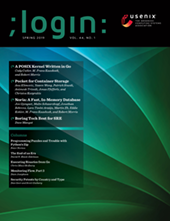
From Data Science to Production ML: Introducing USENIX OpML
;login: Enters a New Phase of Its Evolution
For over 20 years, ;login: has been a print magazine with a digital version; in the two decades previous, it was USENIX’s newsletter, UNIX News. Since its inception 45 years ago, it has served as a medium through which the USENIX community learns about useful tools, research, and events from one another. Beginning in 2021, ;login: will no longer be the formally published print magazine as we’ve known it most recently, but rather reimagined as a digital publication with increased opportunities for interactivity among authors and readers.
Since USENIX became an open access publisher of papers in 2008, ;login: has remained our only content behind a membership paywall. In keeping with our commitment to open access, all ;login: content will be open to everyone when we make this change. However, only USENIX members at the sustainer level or higher, as well as student members, will have exclusive access to the interactivity options. Rik Farrow, the current editor of the magazine, will continue to provide leadership for the overall content offered in ;login:, which will be released via our website on a regular basis throughout the year.
As we plan to launch this new format, we are forming an editorial committee of volunteers from throughout the USENIX community to curate content, meaning that this will be a formally peer-reviewed publication. This new model will increase opportunities for the community to contribute to ;login: and engage with its content. In addition to written articles, we are open to other ideas of what you might want to experience.

In this article we explain the challenges with deploying ML/DL models in production and how USENIX OpML can help bring participants for different disciplines to address the herculean task of safely managing the model life cycle in production.
Machine learning (ML) and its variants such as deep learning (DL) and reinforcement learning are starting to impact every commercial industry. The 2019 USENIX Conference on Operational Machine Learning (OpML ‘19), dedicated to operational machine learning and its variants, will focus on the full life cycle of deploying and managing ML into production. The goal of the conference is to help develop robust practices for scaling the management of models (i.e., artifact of learning from big data) throughout their life cycle. Through such practices, we can help organizations transition from manually hand-holding to automated management of ML models in production (i.e., ML version of the move in server operations from “pets to cattle”).
